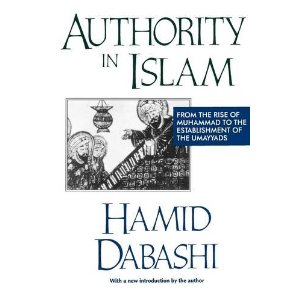
“Muhammad”: The Name of the Prophet in Arabic Calligraphy
In the final paragraphs of my conclusion to Authority in Islam, I began to work my way through a recognition of the three metaphysical paradigmatics of enduring authority I have identified in this book not merely as sectarian divisions within the early Islamic body politic but more important as “three frames of reference, states of mind, modalities of power, modes of authority, or readings of the Muhammadan charismatic experience” . . . active and operative throughout Islamic history. Although I had worked my way towards those final observations through the preceding chapters that dealt specifically with the Sunnite, Shi’ite, and Kharijite conceptions of authority in Islam, at the conclusion of the text I realized that there had appeared avenues of further theoretical observations much beyond what I was then ready to see or suggest.
My primarily theoretical concern with early Islamic history began with the perennial Weberian question of legitimate authority: “When and why do men obey? Upon what inner justifications and upon what external means does this domination rest?” Based on the initial confrontation between the two conflicting paradigmatics of authority, the traditional Arabian and the charismatic Muhammadan, I saw the emergence of three (almost) simultaneous subparadigmatics of legitimate continuity that extended the initial Muhammadan charismatic experience into the rest of Islamic history. The possibility of seeing these three metaphysical paradigmatics of legitimate authority-code named the Sunnite, the Shi’ite, and the Kharijite in their historical and doctrinal identities-then gave me the unprecedented possibility of looking at Islamic history as the successive, simultaneous, and relentless unfolding, in a dialectic of cross-referential anxiety, of structural (re)orderings of command and obedience narrated in an active and legitimate range of discourses-political and otherwise. The detection and implications of this theoretical perspective on Islamic history, from the specific standpoint of a sociology of authority, needs some further elaboration. I would like to take the opportunity of writing a new introduction to Authority in Islam to work through some of these suggestions. Before I do that, it is equally necessary to dwell for a moment on the nature and function of the theoretical language I have adopted in this book.
The sociological language adopted in this text has its distinct historical exigencies. It is a language that goes beyond Weber by virtue of the fact that it is more intimately informed by the Islamics. At the same time, it goes beyond the customary, and still by and large dominant, positivistic paradigms in the Orientalist discourse by virtue of the fact that it takes (in)directions of the sociological imagination seriously. Defining that critical path between sociological imagination and positivistic facticity has its distinct perils and promises. It represents a postcolonial release, deliberately comfortable with both Weber and the Islamics, from both the denigrating and distorting language of Orientalism and the unwarranted anxieties of adapting a “Western” sociological language to an “Islamic” phenomenon. In that release, the wide marginal space between mainstream (American/demographic) sociology and the (still largely Orientalist) Islamics, there is no hidden or manifest agenda to prove either Orientalism wrong or Weberian sociology right. In that wide, comfortable, and rather spacious, margin, the field of my operation in this (and all my other) text(s), the probing force becomes a distinct and identifiable theoretical voice in search of a particular insight into the historical and existential (as opposed to stereotypical and essentialist assumptions about the) experiences of a people. Both primary and secondary sources, both the (in) directions of the sociological imagination and the specifics of the Islamics, become fused and subsumed under the more significant emergence of a theoretical voice=-confident in its points of origin, free in following the directions of its independent judgments-that speaks clearly and succinctly to realities under its investigations, as it echoes the collective insights of other theoretical voices that sustain and energize it.
Assumptions and consolidations of polemical positions on an epistemologically dichotomous bifurcation between such politically necessitated abstractions as “First World theory” and “indigenous theory” are simply false. They are the critical extensions of ideological posturings in some particularly acute and dominant postcolonial anxieties and as such detrimental to an independent and emancipated pursuit of a legitimate theoretical voice. Weber, let alone that empty abstraction called “Western Sociology,” did not invent the sociological imagination. With Samuel Klausner I read The Book of Hosea, with Philip Rieff Kafka’s “In the Penal Colony,” among any number of other similar immortal texts, all in courses in “Sociological Theory.” With my own students I have read Ibn Khaldun and Nizam al-Mulk cover to cover with Weber and Durkheim. I rather think that Ibn Khaldun would have enjoyed reading Weber, or Weber Nizam al-Mulk. That they did not, or that my American colleagues may not read Ibn Khaldun and Nizam al-Mulk or my Muslim colleagues may not read Weber and Durkheim, does not, by virtue of any political pronouncement, constitute and artificial barrier for me who reads them all-in their originals. In my mind, Weber, Ibn Khaldun, Durkheim, and Nizam al-Mulk, among other “great visionaries of the highest,” as Philip Rieff used to call them, dwell comfortably and read each other’s texts conveniently. The theoretical voice that is thus engendered and sustained in my work, the hesitant child of those very confident fathers, addresses one reality or another in the antiquity or modernity of Islamic history. That voice is not, and should not be, reducible to one or the other side of that anxiety-provoking imaginary line that divides the immortal texts of our Republic of Intellect into “First World theory” and “indigenous theory.” The success (or failure) of that voice in addressing something beyond the reach of the Orientalist discourse, as beyond the reach of Euro-American centricity in sociological imagination, is measured only by the range and veracity of the theoretical language it crafts and speaks. The test of that veracity is very simple: Could we now know something quintessentially different about the accumulated data than we did before? Does the application of this theoretical discourse make the mute facts speak a hitherto unspoken meaning and significance?
What I have tried to do in this book is to test the possibilities of a sociological language, with Weber and Rieff as two dominant themes of its universe of discourse, in re-conceiving that momentous occasion when one political culture, as its metaphysical foundation, yields to another. I have taken the case of Muhammad’s charismatic authority, its conception, unfolding, delivery, and consequence, and located it between its immediate fore- and background the pre-Islamic Arabia and post-Muhammadan Islam. The specifics of the pre-Islamic Arabia, to the degree that they mattered to my theoretical concerns, and the dynamics of the Muhammadan charismatics, confronted and clashed so that a new culture of metaphysical resignification would emerge, reordering, as it did, the definition and significance of reality. Muhammad’s charismatic authority was the historical occasion of reimagining the sacred, resignifying the existence, redefining the purpose, point, and “reason” of physically being-in-the-world-a being that narrates, and thus controls, the anxieties of sheer existence into a meaningful and trustworthy conception of the universe, “a unified view of the world derived from a consciously integrated and meaningful attitude toward life.” That act of reimagining the sacred, revisualizing the supreme symbolics, became the metaphysical force, never to be fully exhausted until most recently (just to be reimagined once again), of a moral imagination unyielding and relentless in the capacity, diversity, range, and endurance of its towering authority.
Following that momentous confrontation between charisma and tradition, between the new and the old (fore- )enchantments with the world, I began to see the generic identification of Islamic “sects” and “orthodoxy” more as cultural and character traits and as paradigmatic proclivities in metaphysical choices than merely historical designations of particular social groupings.
(From the Introduction to the Paperback Edition of Authority in Islam)



 Columbia University
Columbia University Aljazeera
Aljazeera Middle East Eye
Middle East Eye Springer Palgrave
Springer Palgrave